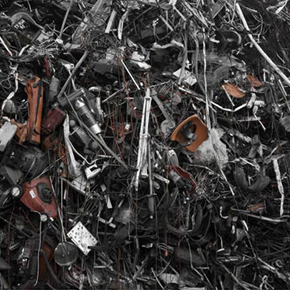
Which metals can be recycled?
Craddock Metal Recycling is a specialist recycler of domestic and scrap metal, renowned for the extensive number of materials it accepts at its yard.
Here is a breakdown of some of the metals it recycles:
Stainless Steel
The process of recycling steel can achieve an energy saving of up to 72 percent, according to statistics from the British Metals Recycling Association (BMRA).
Stainless steel holds an ‘end of life recycling’ ratio of 80-90%, meaning objects manufactured from stainless steel will rarely become waste. This is due to the fact it contains many valuable raw materials, including chromium, nickel and molybdenum, which make recycling the metal economically viable.
Aluminium
Aluminium can be repeatedly recycled again and again, as the metal does not transmute. This means that it will not change form, nature or substance.
The process of recycling aluminium simply consists of melting the metal down; requiring only 5% of the energy needed to create brand new aluminium.
Copper
Research has found that only 12% of town copper sources have been mined. However, it is important to remember that copper is a finite resource and that it is important to conserve copper ore through recycling.
Recycling copper uses significantly less energy than what is used in extracting copper from copper ore – 10% of the energy used in fact.
Brass
Manufacturing brass from zinc and copper is both uneconomical and wasteful, therefore the survival of the brass industry relies heavily on recycling.
Like aluminium, brass is a sustainable material that can be repeatedly recycled. In the UK, brass products are made from almost 100% recycled material.
Lead
Lead’s corrosion resistance enables it to be recycled decades or even centuries after it was originally produced, meaning it has the highest recycling rate of all metals.
Just less than half of the world’s lead production is made from recycled and scrapped materials.
Ferrous Metals
Ferrous metals are commonly composed of iron or steel and are highly magnetic. By using recycled ferrous scrap, CO2 emissions are reduced by 58%, making scrap metal an integral part of many industries.
Car frames contain an estimated 25% recycled steel, and most electrical appliances are made up of approximately 75% recycled ferrous metals.
In addition to its list of accepted metals, Craddock Metal Recycling also recycled everything from scrap cars, vehicle batteries and catalytic converters to large domestic appliances.
View its full list of accepted metals
Latest news

22nd November 2024
Purplex: A tough Budget, but opportunity still knocks
Incoming governments, especially those with significant mandates, inevitably come into power on a tidal wave of optimism coupled with hope that ‘Things can only get better’. Andrew Scott, MD of construction-focused, full-service agency Purplex, talks…
Posted in Articles, Building Industry News, Building Services, Information Technology, news, Posts, Research & Materials Testing
22nd November 2024
Pop Up Power Supplies Gets Arty in Yorkshire
Pop Up Power Supplies has installed 13 new electricity units at The Hepworth Wakefield – read more in this article…
Posted in Articles, Building Industry News, Building Products & Structures, Building Services, Case Studies, Civil Engineering, Facility Management & Building Services, Garden, Hard Landscaping & Walkways, Landscaping, Posts, Restoration & Refurbishment, Retrofit & Renovation
22nd November 2024
OPT Services Revolutionises Fibre Cable Capping with Eco-Friendly Innovation
UK-based OPT Services has unveiled SlimLine™ Capping, a groundbreaking fibre cable protection solution that promises to deliver significant environmental and installation advantages to the fibre optic industry.
Posted in Articles, Building Industry News, Building Products & Structures, Building Services, Facility Management & Building Services, Information Technology, Innovations & New Products, Sustainability & Energy Efficiency
22nd November 2024
CRL: The elegance of Paris balconies - a modern touch for any home
Paris balconies, with their timeless charm and practicality, are becoming something of an architectural staple in urban and rural environments, as CRL explains here…
Posted in Articles, Balustrades and Guardrails, Building Industry News, Building Products & Structures, Case Studies, Garden, Glass, Glass Projects, Restoration & Refurbishment, Retrofit & Renovation
 Sign up:
Sign up: